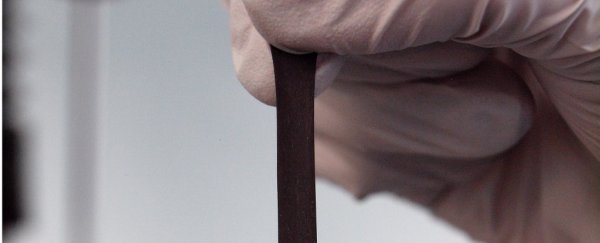The world's largest manufacturer of rubber bands is making its main product immortal.
Alliance Rubber Co., a 94-year-old company based out of Alliance, Ohio, has announced a new partnership with British researchers to infuse graphene into its rubber bands.
The rubber bands could transform how food travels through supply chains, simplify the shipment of fragile electronics, and, most satisfyingly, last forever.
Graphene's signature property is its super-strength. More than 200 times tougher than steel, it is the strongest substance known to humans.
Somewhat famously, in 2008, Columbia University engineer James Hone said it would take an elephant standing on a pencil to pierce through a sheet of graphene as thick as Saran Wrap.
Jason Risner, director of business strategy at Alliance, said the company is spending the next year working with University of Sussex researchers to determine the perfect ratio of graphene to rubber.
Too little graphene, and the bands won't be maximally durable. Too much, and they will lose their elasticity.
Once Alliance figures out the recipe for perfect, unbreakable rubber bands, Risner said the company can begin selling to numerous industries, including retailers like Staples and Office Depot, along with wholesalers working in agribusiness and technology.
Graphene stands to fill in many of the gaps of traditional rubber bands, Risner said. For example, graphene bands can be anti-static, which is critical for companies shipping bundles of electronic goods.
"Nobody who's in the electronics industry wants anything coming near their motherboards and their circuit boards that has the ability to build up static charge," he told Business Insider.
"An anti-static band could be used in all of those settings around electronics and not be a danger to ruining the equipment."
Graphene-infused bands could also be embedded with RFID tags and change colour depending on temperature or time.
Risner said this holds enormous potential for farmers and grocers looking to track their produce as it makes it way to stores for purchase - down to the exact location a single green onion was picked.
"Imagine a rubber band that changes colours if it reaches above 95 degrees Fahrenheit (35 degrees Celsius)," Risner said.
Given that stores must adhere to certain standards for the produce they intake, "the grocery store would know that that produce went above the temperature that was promised to be deliver in, and that it's going to spoil faster. They could reject it at the store because it's changed colour based on temperature."
Customers, too, would benefit once the food makes it to shelves. If a bundle of asparagus normally comes with a blue rubber band but one bunch's is black, for instance, people would know which produce to avoid.
For the millions of people who use rubber bands on a daily basis in home or office settings, however, durability may stand out as the greatest win, Risner said.
Eventually, Alliance wants to put graphene in every rubber band it produces. According to Risner, turning an ordinary piece of rubber into a traceable device - one that won't snap on a moment's notice - would mark the next great leap forward.
This article was originally published by Business Insider.


